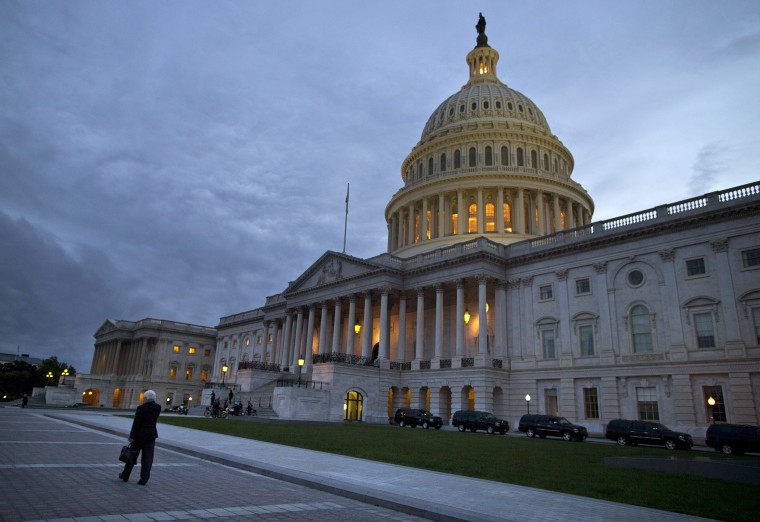In light of some high-profile congressional retirements -- just over the last week, two powerful House committee chairman have announced their departures -- a few readers have asked whether we're seeing an unusually high number of lawmakers decide to quit. The answer is, well, a little complicated.
As of now, there are 39 House members giving up their seats at the end of the year -- 22 Republicans and 17 Democrats -- but that total is misleading because nearly half that total includes House members who are running for other offices. They're not, in other words, "retiring" (giving up elected office).
So let's be more specific. There are currently 23 House members and 7 senators actually retiring in 2014. Broadly speaking, there are a couple of interesting angles to consider: is this more than usual and does it help one party over the other in the midterms.
On the former, consider the recent data from the last several Congresses:
* 112th Congress (2011-2012): 25 House retirements, 10 Senate retirements
* 111th Congress (2009-2010): 19 House retirements, 8 Senate retirements
* 110th Congress (2007-2008): 25 House retirements, 5 Senate retirements
* 109th Congress (2005-2006): 11 House retirements, 4 Senate retirements
* 108th Congress (2003-2004): 16 House retirements, 7 Senate retirements
* 107th Congress (2001-2002): 18 House retirements, 5 Senate retirements
Average these cycles together -- note, these are three midterm cycles and three presidential cycles -- and we'd expect to see about 19 retirements in the House and between 6 and 7 retirements in the Senate. By this measure, we're a little ahead of average this year.
That said, with just three more retirements in the House, we'll have reached the highest level since the mid-1990s, and with filing deadlines still pending in much of the country, that may yet happen.
So if the question is whether the number of retirements seems high this year, the answer is a little murky. Some of the perception is driven by the high-profile members stepping down, at least in the House -- Waxman, Dingell, Miller, Camp, Rogers, Hastings -- but as a quantitative matter, the total is above average.
As for what this tells us about the parties and their relative advantages, the answer is, not much. Both sides try to keep retirements to a minimum in every cycle because incumbents enjoy a 90% re-election rate -- as a rule, the fewer the number of retirements, the fewer seats the campaign committees have to worry about.
But in many instances, especially in the House, what matters more is the makeup of the relevant electorate. If you're a right-wing GOP incumbent representing a ruby-red constituency, it doesn't much matter when you retire, at least insofar as party control matters -- you're going to be replaced by another Republican. The same is true, of course, when progressive champions step down in deep-blue districts.
On paper, Democrats will need to flip roughly 17 seats to reclaim the majority, and when putting together a target list, it's tempting to start with open-seat contests made possible by retirements. But since most of the 23 districts in which the member is stepping down already lean in one direction or the other, and many lean quite heavily, the electoral impact will be muted.
That said, if there are any effects at all, they'll probably undermine Senate Dems, who have enough troubles on their hands this year. Senate seats in West Virginia and South Dakota are currently blue, but retirements give Republicans important pick-up opportunities. Senate seats in Iowa and Michigan are leaning in Dems' favor, but they'll have to fight for them, and had it not been for retirements, they would have been easy victories.
Long story short: the total number of retirements so far this year is relatively high, and the figure may yet grow, but don't expect it to shape party control too much in either direction.
